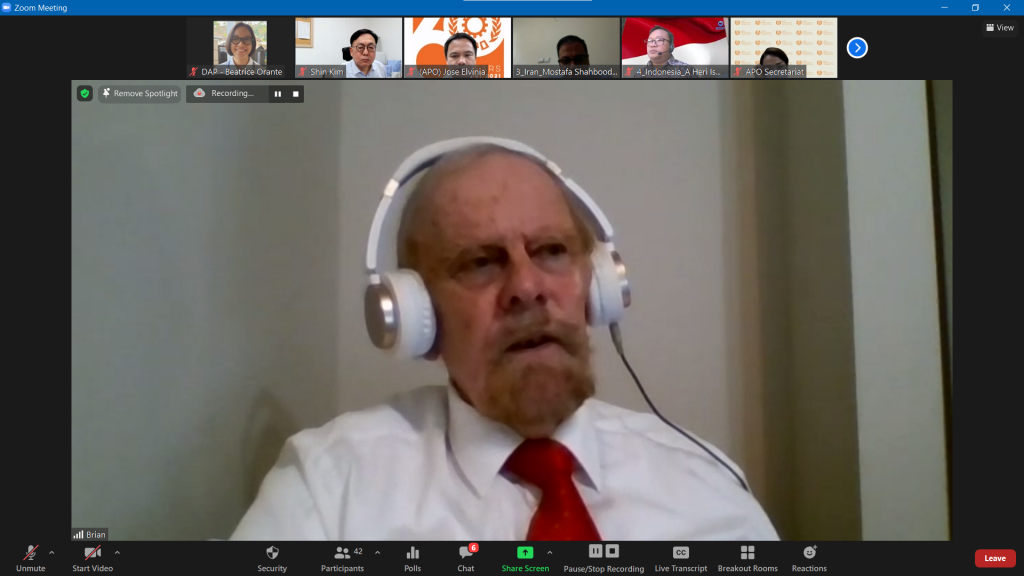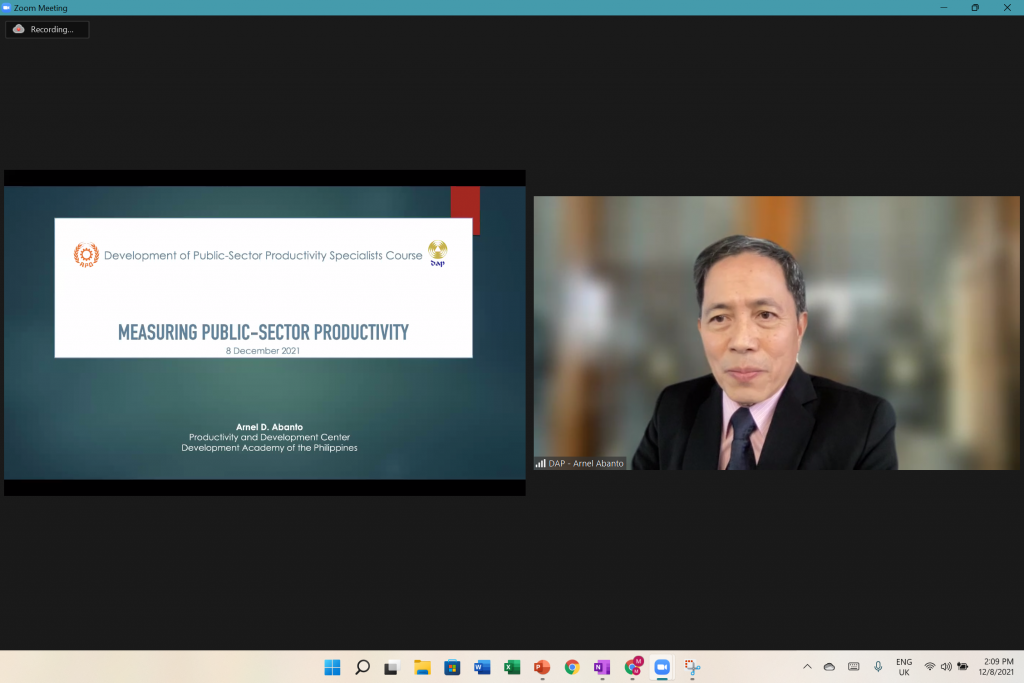The Development Academy of the Philippines (DAP), as the Center of Excellence on Public Sector Productivity designated by the Asian Productivity Organization (APO), held a multi-country training program to develop public sector specialists from 6 to 10 December 2021. With the Philippines as the hosting country, 43 representatives from APO member countries learned concepts, issues, challenges, tools, frameworks, and strategies related to public sector productivity (PSP) improvement.
Throughout the course, the participants listened to various presentations from Dr. Brian Marson, Dr. Shin Kim, Ms. Maria Rosario A. Ablan, and Mr. Arnel Abanto on PSP measurement, performance management, leadership, change management, citizen-centered services, and organizational productivity. There were also group discussions on case studies and exercises on the tools provided to practice what they learned throughout the program.
The course is the first step towards certification as public sector productivity specialists. After their training, the participants are tasked with developing action plans to raise the productivity of their respective agencies using the tools and skills they have gained.
Building the foundation for understanding PSP
Dr. Kim of the Korea Institute of Public Administration discussed first the role of the public sector and global trends in improving productivity. He explained that the role of the public sector in economic development is crucial, and thus a careful strategy is required to promote the social and economic well-being of the people through efficient and effective public sector management. He also discussed the evolution of public administration and provided different case examples to support transforming government.
Dr. Marson of the Institute for Citizen-Centered Service discussed the importance of leadership in achieving key results focused on the 3Ps: purpose, people, and performance. He also showed how the organizing principle around which public service delivery is designed and planned can be conceptualized through identifying and addressing the citizens’ needs. Dr. Marson recommended that responsive government services can be implemented through listening to citizens, meeting their needs, and providing efficient, honest, and integrated service delivery. “To improve citizen satisfaction scores, we need to actively listen to the people we serve,” he told the trainees.

Regulatory reform is also crucial in improving productivity. Dr. Kim defined regulatory reform as changes that enhance the performance, cost-effectiveness, or legal quality of regulations. He explained that while the public perception around regulatory reform focuses on deregulation, it should also include reregulation, smart regulation, and regulatory management. Comprehensive reform is thus recommended over a piecemeal approach, provided that governments must first identify objectives and weigh its options before any reform is implemented.
Dr. Kim then discussed result-oriented performance management, particularly as it is used in South Korea to improve organizational, sectoral and national productivity. He also showed how e-government can improve the efficiency, effectiveness, transparency, and accountability of governments while bringing forth new concepts of citizenship, both in terms of needs and responsibilities, by engaging, enabling and empowering citizens. Governments can use the UN’s E-Government Survey to assess their performance and develop policies and strategies.
Improving organizational productivity was then classified by Ms. Ablan into four approaches: doing more with less, doing more with the same, doing much more with more, doing the same with less, and doing less with much less. Government units that face productivity issues can diagnose and solve them through the Plan-Do-Check-Act Cycle, but for productivity improvement projects to be successful and long-standing, they have to manage political, technical, and behavioral conditions. Ms. Ablan also recommended striving for continuous improvement and innovation to ensure continued productivity.
Operationalizing productivity improvement
To open the session on the development of productivity improvement plans, Dr. Marson discussed models, frameworks, and thematic approaches that are the focus of the management excellence agenda in APO member countries. He also discussed steps to improve overall organizational performance using the CAF (Common Assessment Framework) Model, which uses self-assessment to generate and prioritize possible improvement plans, and the APO Business Excellence Model.
Mr. Abanto followed with a presentation on measuring public sector productivity, discussing key considerations in estimating public sector productivity such as the level of analysis, the availability and quality of data, the information needs of the user of productivity information, and the productivity measurement framework being used. He also explained how to calculate public sector productivity indexes to prepare participants for a breakout session that would allow them to try their hands at productivity measurement.

On the last day of the training, local presenters from the Philippines shared their best practices and experiences to illustrate the concepts and approaches at work. Mr. Joel Mendoza, of the City Government of Ormoc, Leyte shared the city’s improvement and intervention for better service through the in-house development of systems for business and franchising permits that enable small enterprises to easily process their permits. Ms. Marizza Grande, of the Philippine Statistics Authority, also shared the agency’s improvement with the Decentralized Copy Annotation Process (DeCAP) project, which provides seamless processing of documents at regional centers.
